Channel training the wrong way – righting the wrongs
This article focuses solely on my journey to my second attempt of the English Channel. I will publish an article later for an overview of my whole journey from the point I started thinking about doing this in 2018.
As mentioned before, after failing my Channel swim attempt in 2021, I had no intention to retry the swim in the near future. However, I made my second attempt on 2023-09-07 and got a provisional success in 18 hours, 21 minutes.
Motivation
I didn’t immediately sign up for another booking after my 2021 failure, as I was clearly not ready for it. However, a few successes from expats in Hong Kong in 2022, including Allan McPherson, my goddess Edie Hu, and also Li Ling Yung had made me jealous again. By early 2023, I thought that my missing training was on track for another attempt, including lessons with Ray Gibbs at Swim Canary Wharf, and my pool training sessions over the winter giving significant improvement as well. I then enquired about availability and booked a slot with Lance Oram, slot 3 on 23 August to 28 August (neap).
Training
Apart from the technique lessons and pool training sessions, the lack of those being the main reason for my 2021 failure, my intention was to join Dover Channel Training for the season as well as I lived at a place with quick and easy access to an HS1 station. However, they refused to give training to me saying that I have some “special needs” which they can’t keep me safe, despite that I had never swum with them before. This is something I will never forgive. As a result I went to Brighton to do sea swimming on my own, and if the weather was unsuitable, I swam in an inland lake instead. I negotiated with my company when signing the contract for my new job to allow me to take unpaid leaves on Fridays such that I can have more training time, but due to a change of the leave period, I ended up with extra paid leaves so I didn’t use that provision as a result. My company also doesn’t have a leave policy so I could negotiate with my manager to allow me to take short notice leaves for the actual swim.
However, training alone isn’t conducive if I want to do long training sessions, such as a 10-hour swim, and I have no training partners. Fortunately Pip Barry went to my rescue and offered me a session at Deal, which ended up being crucial to my final success.
February to April
It was still spring, with the open water in the UK so cold that no meaningful training was possible, therefore I mainly continued my pool training in a heated pool, with weekly mileage averaging 18 km per week. I had a lesson with Ray Gibbs in February, which was supposed to be my final lesson before summer as I started training for swim races afterwards in March and July.
Most of my pool training are interval sets, where I see visible improvements over time. I made a PB in a 1500 long course pool race in March, with the result at 25 minutes and 36 seconds, validating my effort.
May to June
As summer began, I moved my pool training to an unheated pool, and started open water training. However, my cold tolerance decreased compared to 2 years ago, and without a training partner, I didn’t feel safe to push my period in cold open water. The majority of my training sessions were still in a pool. The 6-hour assessment swim became my first hurdle as I couldn’t build up to over 3 hours in May. Luckily I overcame that hurdle in the first week of June when the sea temperature was just below the limit (16°C). After the hurdle was overcome, I started to look for long distance training partners but I couldn’t find any. I did at most 6 hours alone, but I didn’t do any back to back, the most was 6 hours + 4 hours separated by a day, as I was so tired after the 6 hours that any meaningful training was impossible the day after.
All my pool training was racing oriented as I was preparing for the regional open water championships. My weekly volume averaged 21 km per week in the second half of May and the first half of June, peaking at 25 km. I made another PB in the 5 km regional open water championship, completing the race in 1 hour and 31 minutes.
July and August
After my open water race, I could finally concentrate on my Channel swim. Pip offered to accompany me for a 10-hour training at Deal, near to his family, on 8 July so I took up the chance. However, the current was so huge there and after just 5 hours I was so tired so I asked if I could abort the torture, as I didn’t think I would make the full 10 hours as planned. He kept me until 6 and a half hours until I was allowed out. He then showed me videos taken comparing the form of he and me, explaining how inefficient I was compared to him, and said straight to me that I wouldn’t get across the Channel with that form despite having the fitness to do a 2-way. He asked me to book a lesson with Ray immediately, telling him I would do a Channel swim, for him to make me more efficient. I immediately did so and took the lesson on 14 July. Afterwards all my training, in both the pool and open water, was to work on my efficiency such that I could swim for long without getting tired. My open water training sessions afterwards had then become much less tiring than ever before. The average weekly volume in the month centering on 24 July, one month before my booked tide, was 19 km per week, with a peak at 24 km per week.
Pre-swim
When I asked for a crew member, Pip Barry, who is a very experienced open water swimmer, immediately accepted the request, to the extent of putting it over his job in construction. He is really a saint, I couldn’t even reach this level of dedication for my own swim as I wouldn’t be willing to pass a once-a-lifetime opportunity to race a British Championship in a team with my long-term Hongkonger friend (Himmy Lau) in London if the swim was postponed (which made him angry when I mentioned the possibility). Ingrid Chow, my partner in my relay last year, was the other crew member to assist Pip.
However, I didn’t get a chance to go on my booked neap tide as the pilot was at capacity bringing out swimmers and teams on all available good weather days, and even borderline days as well. I was told to start on 29 August 02:00 2 days before, but it was cancelled when the forecast issued the next day became worse, and the pilot brought a team out instead. As a result we lost a booking, priced at £130, for a hostel room which only offered nonrefundable rates. The weather on the next spring tide was crap as well so no solo could go on the whole tide.
When the pilot asked about my availability, I told him to avoid 6 September to 18 September. I had races booked for these 2 weekends, including Dock2Dock, London City Race, and British Sprint Relay Championships, all in London with the British Championship a once-a-lifetime opportunity as it is held in different places every year. However, it was negotiable if the opportunity was too good to pass.
After a cool summer, the weather ended up in a rare autumn heatwave between 6 September to 9 September, with 9 September being the bottom of the neap tide, resulting in a weather opportunity which was too good to pass, showing dead calm (sustained wind at Beaufort Force 1 or less) on 6 September, 8 September and possibly 9 September, and a little texture (sustained wind at Beaufort Force 2) on 7 September. The pilot offered me a start on 7 September 01:00, which I immediately accepted as it would have minimal impact on my race bookings. My stated swim speed was 2.5 km/h, which was what Pip told me as I was uncertain, and the training I made after the technique improvement suggested that my cruising speed was 2.6 km/h for short swims up to 3 hours, so 2.5 km/h would be reasonable for a longer swim.
As the meeting time was 01:00, there was no need to book accommodation this time. I generally prefer taking the high speed train to go to Dover for a Channel swim, but because my partner Ingrid, who lives in Reading, might need to go to work directly at some inconvenient places afterwards, she insisted on driving her car. Therefore I asked her to pick me up at Vauxhall, which according to Google Maps would add 8 km and 11 minutes compared to going via M25 (South). The journey turned out to be bad. I allowed 40 minutes before the meeting time but a series of construction works caused congestion in inner South London making us use 45 minutes from Vauxhall just to get out of Zone 2 at Lewisham, and we arrived only 15 minutes before and we didn’t know how to park yet (as I don’t need to care by using the high speed train, which is much faster, taking 1 hour and 5 minutes only from London St Pancras to Dover, than driving the whole way). Pip made his own arrangements to come, which turned out to be his car. The parking was a bit messy as the car park wasn’t open to the public at this time of the year, requiring a special code to access, so Pip told me to use the code obtained last year for that. Pip also spent some time finding us as well due to a confusion of location, and the boat crew ended up waiting for them as well, giving me more stress before I started as I was so afraid of missing the tide.
The swim
All photos are taken by my crew Pip unless otherwise specified.
The swim started at 02:04 at Shakespeare Beach, just outside the Dover Harbour.
At the start, I immediately used the new efficient form I learnt as soon as possible. The first few hours were mentally the most difficult, as the upcoming journey was a long torture. I tried to use self-talk including “This is just the start, what’s the point of doing this if I can’t even get to half-way?”, “Today is a good swimming weather that I should enjoy swimming all day long.”, “I can’t face everyone, especially Pip, Ingrid and 汶而 (who I’ll introduce later), if I get out so early.” Then I tried to recite bus routes, MTR stations in Hong Kong, etc., to help time pass, but as I have been out of Hong Kong for so long, my memory of these had begun to fade and it no longer triggered emotions like two years ago.
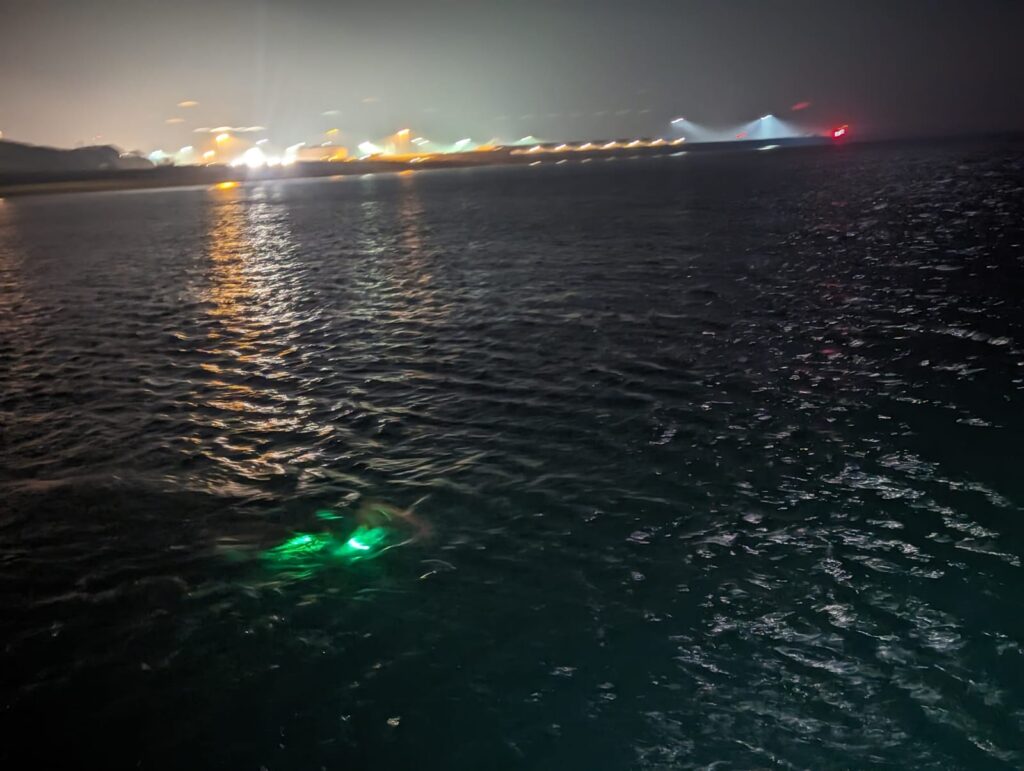
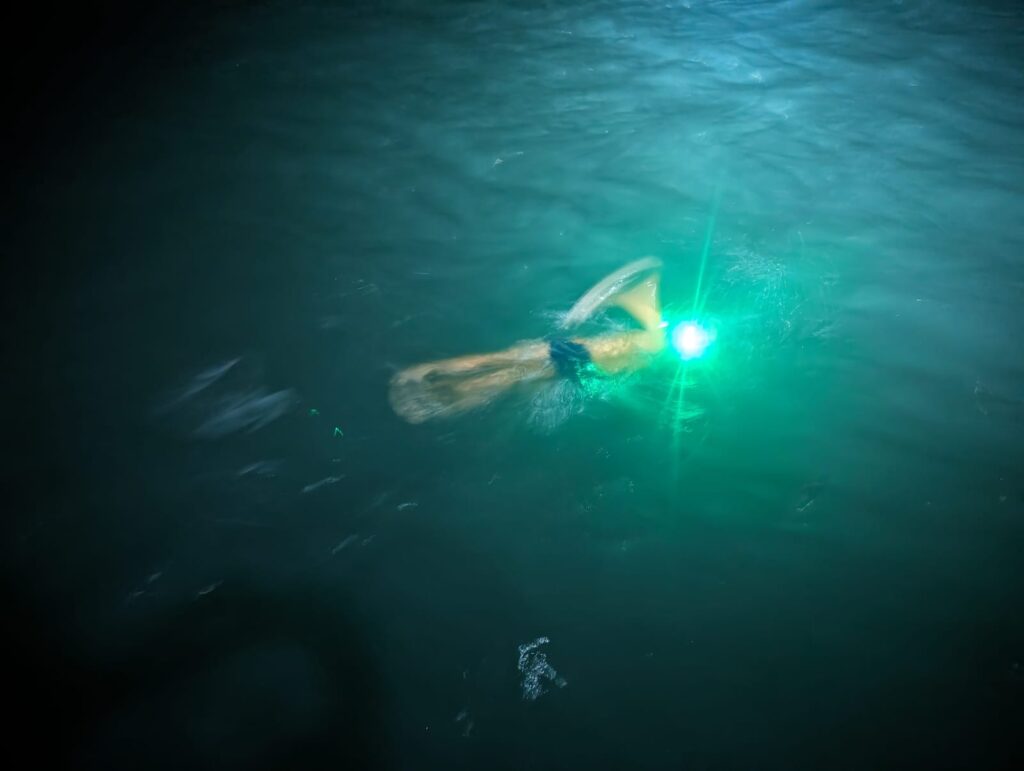
My feed plan was 100 g maltodextrin + 200 – 300 mL water every hour. I mentally prepared for a 14-hour swim so I would count from 1 to 7 then down to 0, by that point I should finish, or be very close to it. However, the numbers I counted mismatched the sunrise time so I was a bit confused. I asked Pip what time it was at the 7th feed and he refused to answer. Also I didn’t see a single ship in sight in the shipping lane by that point so I couldn’t judge my progress (i.e. if I was in a shipping lane or the separation zone, judging by the direction of the ships).
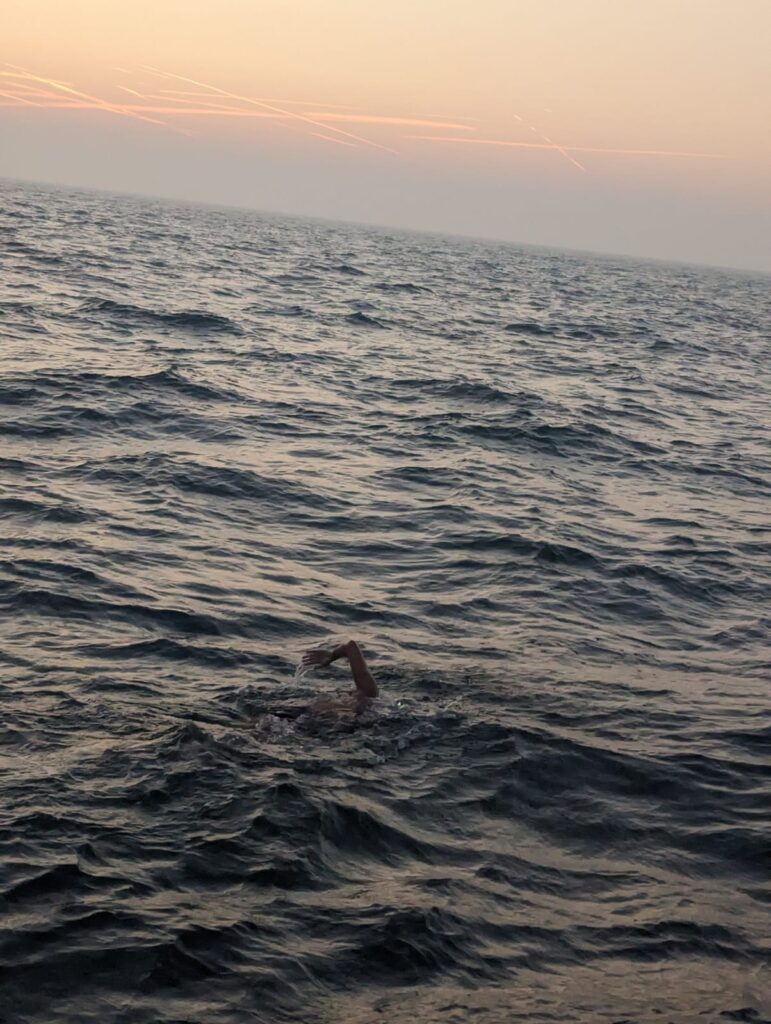
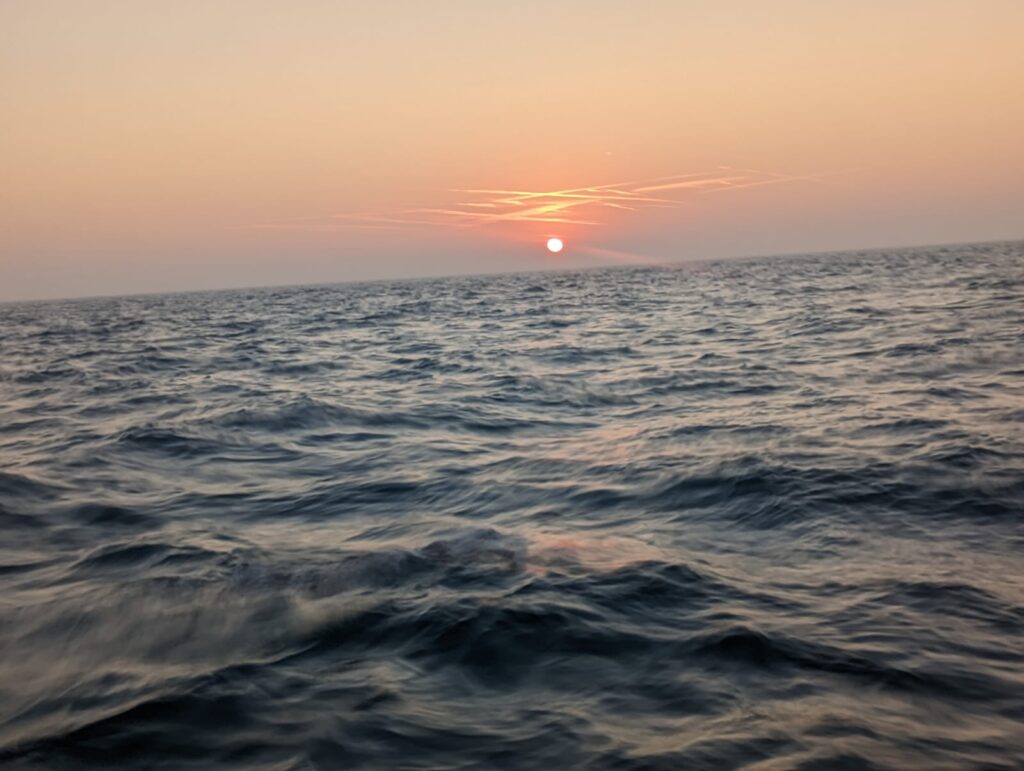
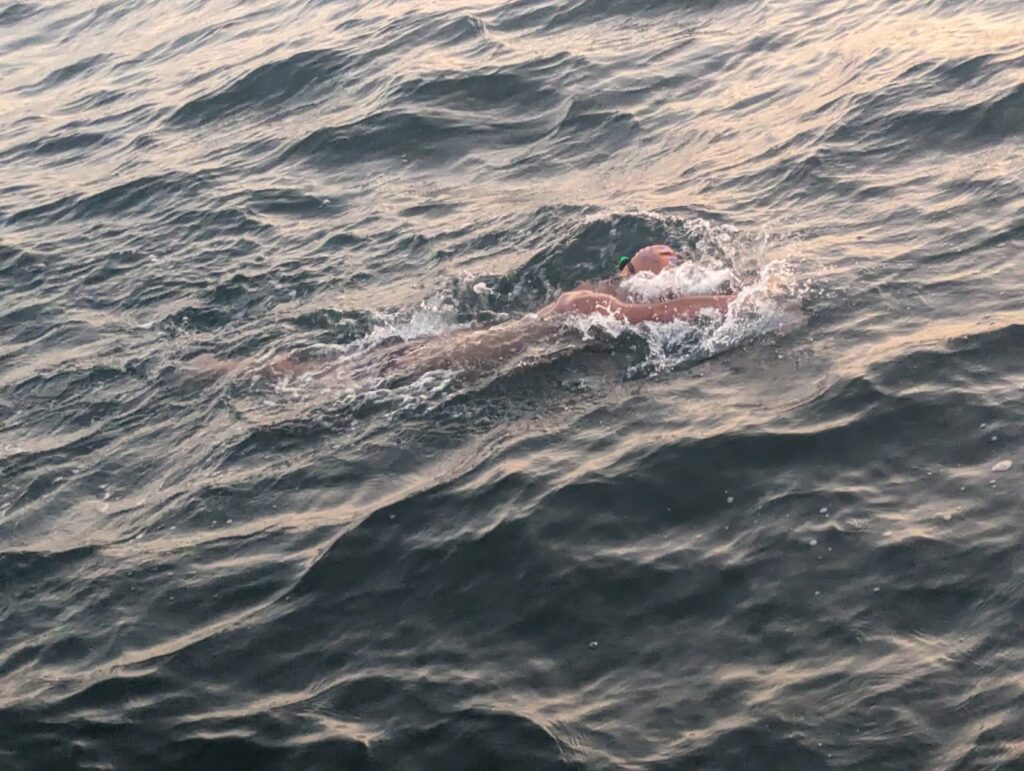
At about the 5th feed I was suffering from the lack of sleep as I couldn’t sleep well out of pattern the day before, but the symptom disappeared later into the day.
Tiredness built up gradually on my back during the swim, but not as severe as my long swims before causing massive speed drops, so I could still keep my form reasonably until around the 11th feed. However, I also did a few strokes of backstroke or butterfly occasionally, normally after feeding, to recover my muscles.
By the 11th feed (countdown from 7 down to 3), fatigue had built up to the point affecting my form and land was still not in sight, so I started becoming impatient and asked Pip questions such as “What time is it?” (to know how much time remained until the tide changed direction to sweep me eastwards, which could be fatal if not enough progress could be made), “How far is the shore?” (to know how much time my remaining suffering would be for me to plan my effort), but Pip refused to answer any of my questions. Eventually the sun was gone to a position suggesting the tide change time passed, and land was still not in sight. I was so worried but I had no choice except to keep swimming. Without an ETA, I then went into energy-conserving mode, not putting any effort in my stroke.
The feed countdown reached 2, 1 and 0 still without land in sight, and I was really worried as the tide change time passed, but Pip continued refusing to answer my progress-related questions. Then captain Tanya put pressure on me to get as much out as I could to break through the tide and reach the beach. I knew that this is a critical point to avoid sweeping further east than intended, adding hours into the swim time, so I increased my effort to medium (approx. HR zone 3, will build tiredness in my muscles). I tried to keep it as long as possible but there was no possibility to sustain it for as long as it would take to complete the swim without an ETA, so it eventually broke down. Pip also increased the feed frequency as well.
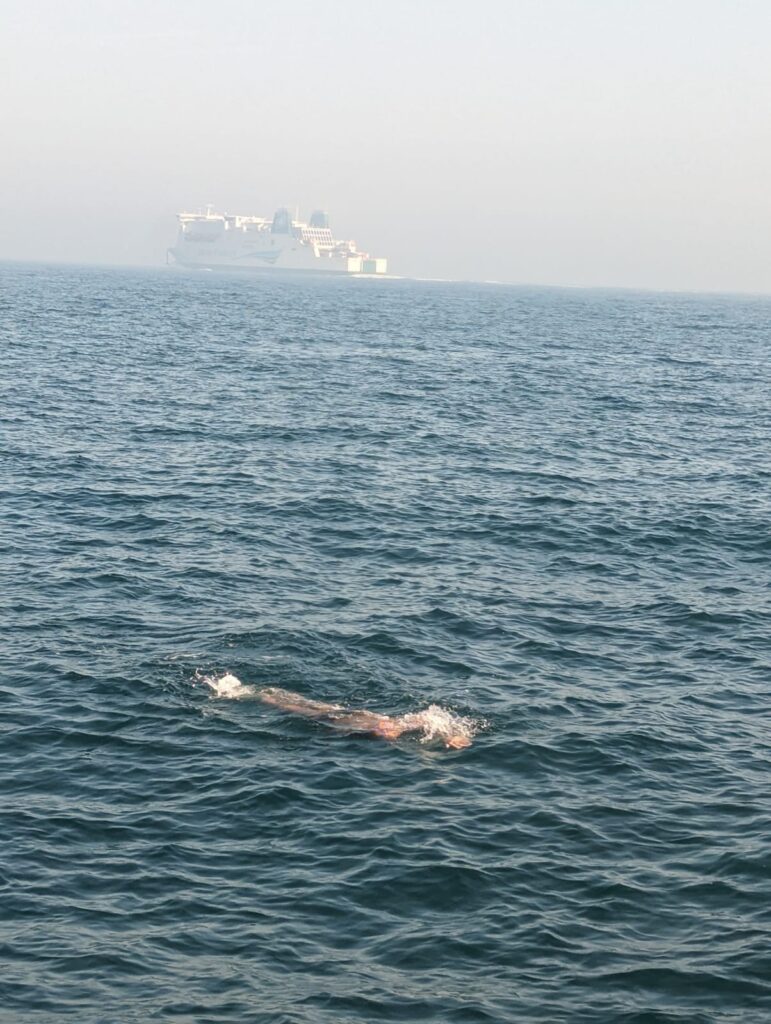
My mind was empty at that point as I only wanted to end the suffering as soon as possible, and I had already run out of sequences to recite to fill in my mind.
Suddenly land appeared ahead of me. I knew my suffering would end soon (likely in 2 hours for 5 km) so I suddenly got a boost and started swimming at race effort. However, it felt forever as race effort wasn’t meant to be used in a long swim. More worrying was that the sunset was near. By sunset my swim would have already been 17 and a half hours long. I swam as fast as I could, to the extent of adding leg kicks as well. The final approach was dead calm but it still felt forever, and the inevitable (sunset) finally came before I reached shore. It was high tide at that time and I had to swim all the way just before the cliff to clear water. The cliff looked close but the boat still continued, after a very long time the dinghy was launched with Captain Lance on it. Also unexpectedly Ingrid also swam to shore after me as well.
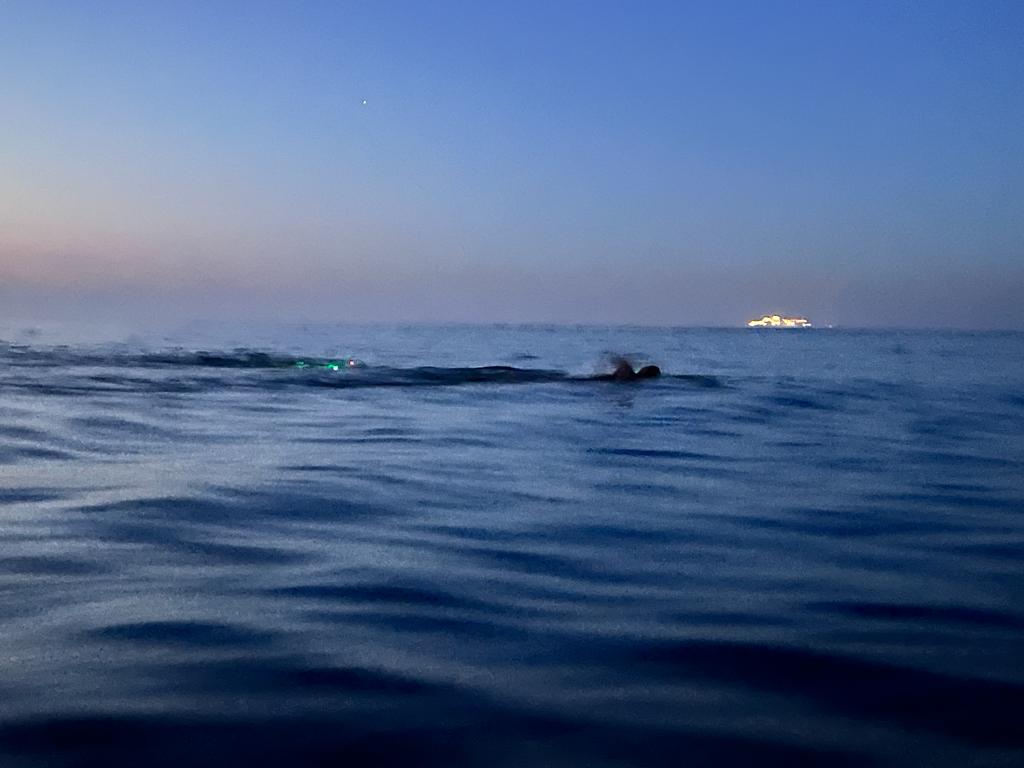
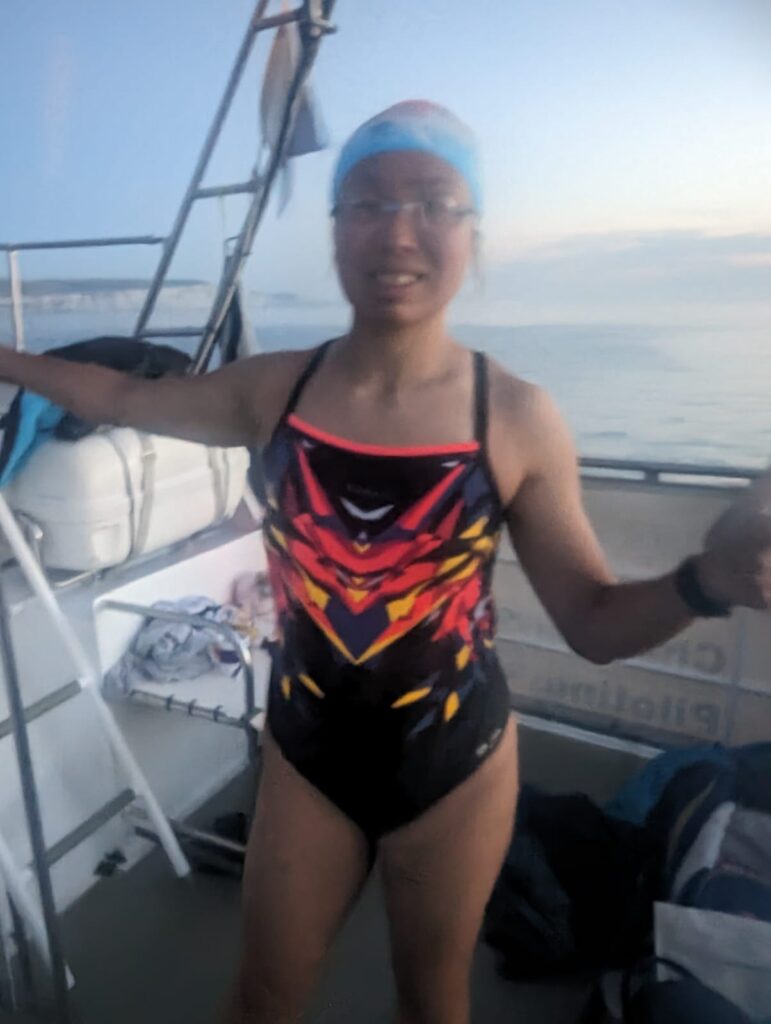
The cliff looked so close but it took me forever to reach. Civil twilight was ending as well. And there was a jellyfish boom near the shore as well, so I was stung multiple times. Eventually my hand hit sand so I walked out to clear the water, and the captain told me my swim was completed. Ingrid then hugged me with a photo taken (courtesy of Captain Lance). We landed at Le Petit Blanc Nez, the same place as the relay last year. The same as last time, there was no one welcoming me in French. It is a sandy beach ending with slippery rocks so no pebbles can be grabbed. My provisional time was 18 hours and 21 minutes and, subject to ratification, I have become a CHANNEL SWIMMER.
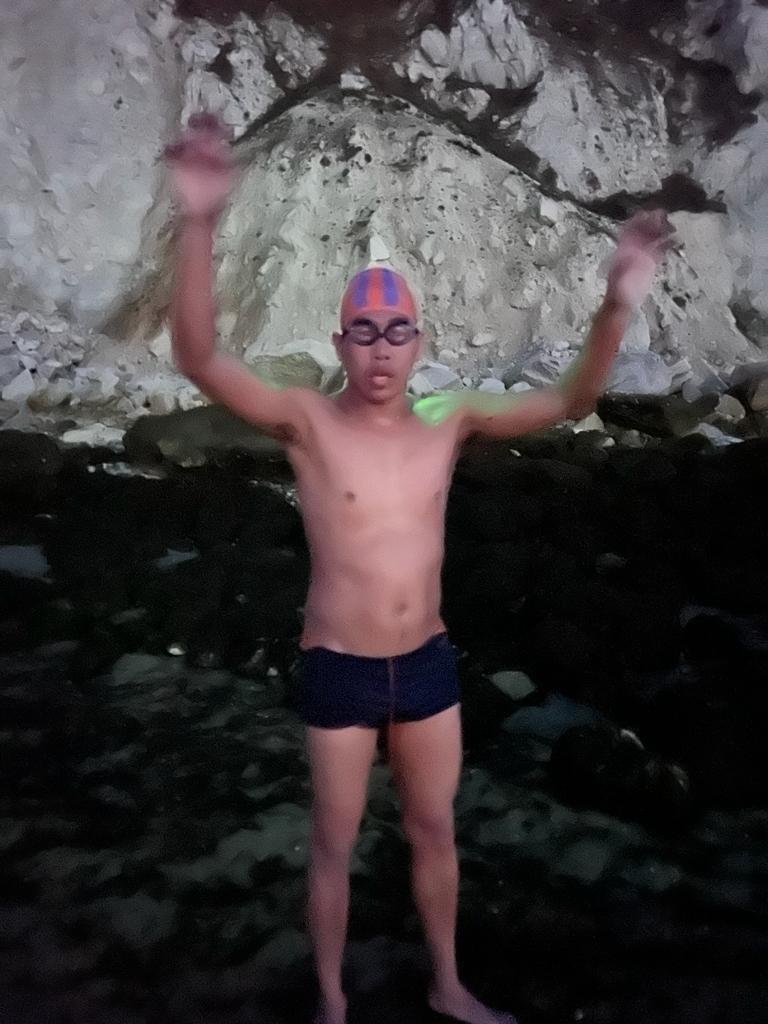
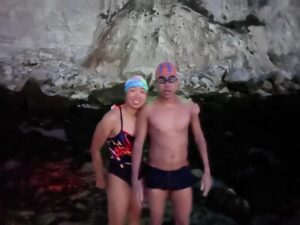
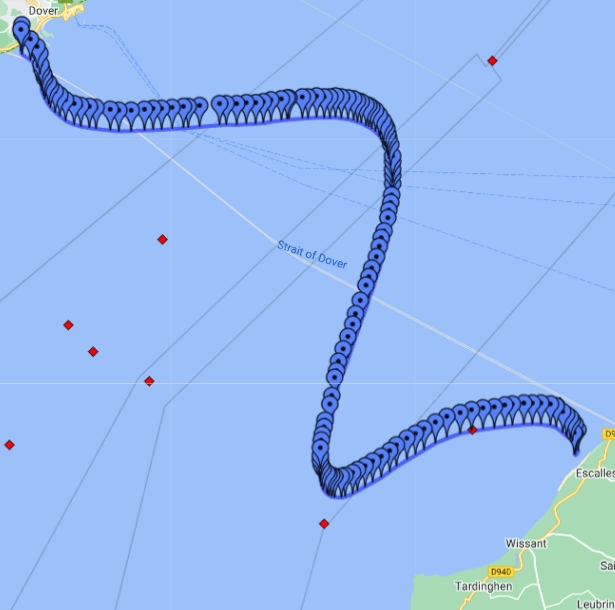
I peed throughout the swim without any problems. I started to poop at about half way of the swim. Initially the poop was good but as I became tired, I started to swallow more and more of the sea and the effect was pooping and farting uncontrollably as happened in all of my past long swims, to the extent that I no longer bothered to pull down my trunks when I pooped. My back became fatigued and my legs also became tight in the later part of my swim, however not to the extent that it affected my stroke and peeing (in the failed attempt 2 years ago) or to the extent that injury built up (in the failed Windermere race last year).
Once back on the boat, I started to take about that it was so late in the evening that I would miss the last train back to London, as there is no overnight transport in Dover, and no overnight tube service on a Thursday night, and it will take a really long time fighting traffic across Central London to get back to my home in Willesden.
During the return journey, I chatted about the swim tracks I admired and Captain Lance explained to me that my track was exactly what he expected. He actually expected me to have an 18-hour swim after I reported my speed to be 2.5 km/h and a track which aimed for the cap would take a longer time and require me to swim more in darkness which he would rather maximise my time in daylight.
Lessons learned
- By putting in the appropriate training, I am able to swim the Channel. I’ll blame my failure two years ago on the restrictions causing me not being able to get coaching, or do my pool training.
- I should have followed Pip Barry when I made my initial move to the UK in April 2021. At that time, I followed the advice of another so-called “friend” (also a Channel swimmer, and the friendship diminished when he made clear that he wouldn’t support my swim goal calling it unrealistic, and ended when I said something which he felt offended after an unsuccessful North Channel attempt) to a place where I totally hated (Bournemouth) just because there are regular Channel swimmers training there, but no one there pointed me out my problems when I repeatedly, to the extent that it annoyed people, complained to every one that my speed dropped hour after hour in every long training I did. It was because my technique was so inefficient so I was burning out my fitness every time. Pip lives in South London so it was a binary choice between conflicting advice.
- The latter part of swim was a torture for me as I had never trained enough endurance-wise, because I didn’t have enough time to redo all my training when I made the technique improvement just 6 weeks before my booked tide. I would not even think about swimming back to England at all.
- Channel swimming is not a sport I want to do unless for chasing records. What I really want is to do marathon swim racing up to 25 km. However there are no such opportunities in the UK as the distances on offer in the Swim England sanctioned races are normally only up to 5 km. Therefore I hope to become good in this distance, qualify for the nationals and internationals, and race in the world circuit. But people are telling me this is unrealistic and I have yet to find a club suitable for my ability which can pave me a pathway to that level, as most squads require 3 (or even 4) strokes to join and I am interested only in distance freestyle.
- My swim time was 18 hours and 21 minutes even on a day with near-perfect weather. I was hoping for a 14-hour swim (by dividing the straight line distance by my cruising speed). The pilot is very experienced and he planned an 18-hour swim for me when I told him the speed was 2.5 km/h and he was right. I would be doubtful if I could still make it if I hit by conditions like what happened 2 years ago. The English Channel is swimmable by all sorts of speed, but some other channels, like the Gibraltar Strait, have a minimum speed requirement which I can’t meet because those channels have a single-direction current rather than changing every 6 hours, therefore I don’t want to continue doing this sport as I won’t get further success unless I’m fast enough. Also, my time is on the slow side among English Channel soloists as well, suggesting that my swimming ability, while good enough to swim the Channel, is much less than the people who are serious in this sport. This is also the reason why I want to do competitive swimming, such that I can improve my ability, but people keep saying that’s unrealistic. Also, I’m jealous of those who crossed the Channel faster, as one less hour of the swim meant one less hour of torture for me, and a 10-hour swim for me would be an enjoyable day out on the perfect weather rather than torturing myself to swim when the whole body was worn out after half a day.
- I was still undertrained for this attempt so fatigue built up in the later part of my swim. If starting fresh in this sport, I wouldn’t have booked the slot before I trained enough, using Chloë McCardel as the gold standard. However my previous failure was cursing me to the point that in every sports race, when things got tough the failure would appear in my mind, and I could never walk out of that failure unless I could go back to complete the unfinished business in order to blame my failure on the COVID restrictions. So I booked the slot this year despite it being clearly irrational (as I felt bad at the end of Vidösternsimmet and failed the Windermere last year), just because I wanted to walk out my past failure.
- I don’t want to go to Dover by car again even in the late night as construction works made the traffic in South London so bad on the way to the A2/A20, and I won’t want to drive home after crewing. Also I won’t use Google Maps for driving directions as well as Ingrid used it on our return trip which guided her to drive extra miles on small residential roads rather than on the A406 North Circular all the way. I always prefer taking the high speed rail and, I should have advised her to put the car in Central London and take the high speed train to Dover when she insisted on driving her car for possible work afterwards.
Conclusion and future plans
Subject to ratification, I have become the 3rd Channel swimmer from Hong Kong, just one day after the 2nd Hongkongers’ team completed the relay, and my regret has been removed as a result.
However, I won’t book any channel swims, or solo ultra swims of a similar sort, with the exception of my bucket list items (round Hong Kong for nationalism reasons, and if I eventually become fast enough, the Gibraltar Strait which is short enough to be a nice day out). Swimming channels is meaningless for me unless it’s for setting records, and my real motivation for the 2021 attempt was to become the first Hongkonger to do so (and Chun Kong Mak did it in 2020 with a second-hand slot). This time is for real as I have already removed my regret which has been cursing me for 2 years.
I still want to train for competitive open water marathon swimming despite people repeatedly telling me it is unrealistic, because it is something I love to do. If I can reach that level, further channel swimming will no longer be a problem and I will make a comeback to the sport of channel swimming to break records. However, if I can’t reach the level where others think as unrealistic, I will give up swimming altogether and only do one or two long swims (about 10-15 km in length) a year in either Hong Kong or the city I live in to keep my fitness, and put my time into other things I want to do as well, including learning map design, growing my software business, other sports such as sailing and recreational diving, etc.
A few funny thoughts…
- I float so well in the sea, like having a buoyancy aid built into my body. My legs are so high in the sea so I’m kicking out of the water with very little effort. Even in triathlons where wetsuits are allowed, I will only consider using it for the intended purpose (i.e. to keep warm), in the minimum thickness just enough for that purpose.
- The sea is so tasty that it’s a pleasure to swim in, but unfortunately if I drink too much of it (most likely when it is rough, or if I get tired) in my swim I’ll start pooping uncontrollably! Also only after I got out I started feeling the effect of salt tongue! Although the effect was mild and by the time I returned to the harbour, I no longer experienced any discomfort, and it would not be a limiting factor for me at this stage.
- A man looks so tiny in the ocean. In a Channel swim I’m always being watched by someone from the boat so I’m safe. Nonetheless, I still feel vulnerable as it’s so easy to slip under and never be seen again, and I trust the people on the boat being able to jump in and grab me from underwater if this rare unfortunate situation happens. However, in a MOB situation, the lookout must constantly keep an eye on the man otherwise the man will get lost easily. Normally, the vast majority of a man is submerged and only the very top of the head is out of the water which is very hard to see; in rough weather, even someone actively swimming can be hard to spot as well when he appears and disappears between waves. Worse, if the man sinks under the surface while being unconscious, a rescue is practically impossible. That’s why wearing a lifejacket is vital when on deck out in the open ocean.
Acknowledgments
During the swim, I thought about so many people in my mind who I can’t let off if I don’t complete, and some of them were great motivators as well:
- Pip Barry: my saint since I booked this attempt, sorry for ignoring you two years ago due to ill-formed advice which resulting me choosing Bournemouth as my first place to live in the UK. You offered to crew for me at all costs at the instant I started looking for a crew member. Without you, my success wouldn’t be possible. Thank you Pip.
- Ray Gibbs (Swim Canary Wharf): your lessons have brought me so much improvement in both swim racing (until February this year), and in long distance swimming (after Pip told me to have one more lesson with you). I had no chance to get technique improvement while I was in Hong Kong due to pandemic closures, and by moving to London I now have access to such a great swim teacher.
- Captain Lance Oram and Captain Tanya Harding: you are among the best captains in the whole channel fleet, who actually cares about the success of swimmers by plotting courses to each individual’s speed, and patient enough to work for up to 29 hours non-stop as well.
- Ingrid Chow: As the only other long distance swimmer I know, by the time I swam the Channel, among Hongkongers living in the UK, I’m grateful that you continue to help Hongkongers like me to make success stories in the Channel. Also, your booking for a 2024 attempt has motivated me to complete my swim, such that I won’t let you off.
- 許汶而: I started to chat with you when you announced your 2025 attempt publicly to become the first Taiwanese Channel swimmer. Although I don’t live in Taiwan, I know I can’t let you off as well as the challenges for Hongkongers and Taiwanese to swim the Channel are similar, having a lack of local community and no / little prior experience.
- Edie Hu (my goddess), Alan McPherson, Li Ling Yung: We swam together in the past in Hong Kong. Your Channel swims last year motivated me to do the same as well.
- Eliza Chang, Melody Cheung, Fanny Lau, Leo Chan (Channel relay team “Hong Kong Team 2023”: your success on the day immediately before my swim was a great confidence booster.
2 thoughts on “Channel training the wrong way – righting the wrongs”
Bravo, Michael!!
You are a true hero!!!
We are proud of you Hongkonger!!!
Michael,
So pleased for you.
Glenda (Beyond the Blue)